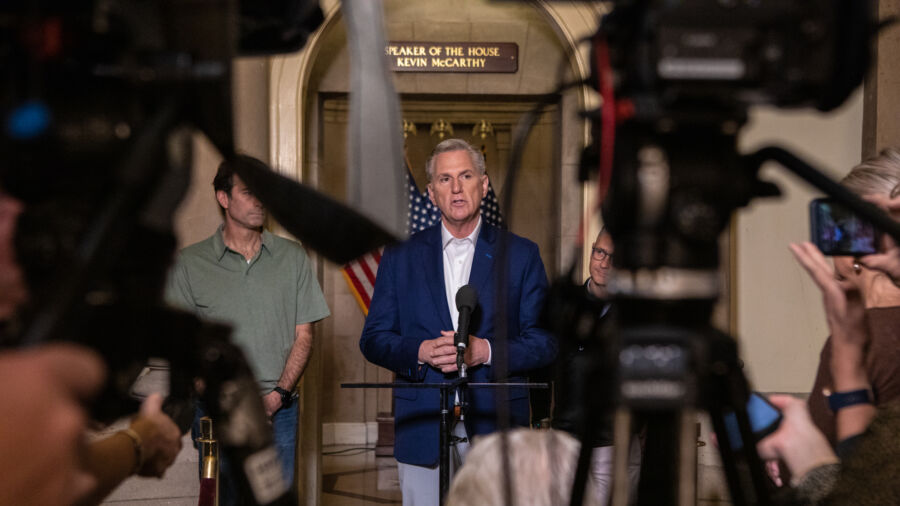If Congress passes the newly-agreed plan to raise the debt limit, the deal would be the first major deficit-reducing budget agreement in over 10 years, according to the Committee for a Responsible Federal Budget.
Maya MacGuineas, president of the non-profit organization, said in a statement on Saturday: “In the 11th hour, our leaders are showing us what they can do when they come together for the good of the American people.
“If it passes, this plan would be the first major deficit-reducing budget agreement in almost a dozen years and would signal Washington is serious about making progress in addressing our mounting national debt.”
House Speaker Kevin McCarthy (R-Calif.) and President Joe Biden announced they had reached the tentative agreement to raise the debt limit on Saturday evening.
The deal would culminate in a suspension of the federal government’s $31.4 trillion debt ceiling after months of deliberation.
The announcement was made following intense long-term negotiations. It faces major obstacles before Congress will give its final decision prior to a deadline in early June.
“I just got off the phone with the president a bit ago. After he wasted time and refused to negotiate for months, we’ve come to an agreement in principle that is worthy of the American people,” McCarthy wrote on Twitter.
According to a statement by Biden, the deal marks an important step forward.
“The agreement represents a compromise, which means not everyone gets what they want. That’s the responsibility of governing,” Biden said.
The agreement would effectively suspend the debt limit through January 2025. Further spending in the 2024 and 2025 budgets would be capped and unused COVID-19 relief funds would be redeemed. In addition it would speed up the permitting process for some energy projects and include additional work requirements for food aid programs for poor Americans.
According to MacGuineas, “by addressing the debt limit, the plan would also remove the risk of default and ensure America continues to pay its bills.”
“This agreement came too late, but better late than never. The House and Senate should move quickly to make sure we reduce deficits and raise the debt limit in a timely manner,” MacGuineas added.
“Then, they should work to build on this success. The process was tense, risky and ugly, but in the end, we have a plan to enact savings and lift the debt ceiling, and that is what is needed.”
The agreement was reached on May 27 after several months of back-and-forth. Biden and McCarthy discussed the deal in a 90-minute phone call, after which McCarthy briefed his members later in the evening. This was followed by statements from the White House and the House leader.
“We still have more work to do tonight to finish the writing of it,” McCarthy told reporters on Capitol Hill, adding that he expected to finish writing the bill on May 28. He would then speak to the president, with a vote on the deal expected on Wednesday.
Bipartisan support is needed from both the Republican-led House and the Democrat-led Senate before Biden can sign it, indicating the intricacy with which Biden and McCarthy have to maneuver in finding a compromise.
According to McCarthy, the deal includes substantial spending reductions.
“It has historic reductions in spending, consequential reforms that will lift people out of poverty into the workforce, rein in government overreach—there are no new taxes, no new government programs,” he said.
If the deal passes through the narrowly divided Congress before the debt ceiling issue is resolved by June 5, it has good potential to prevent a default, which could prove economically destabilizing.
Republicans were sharply critical of the deal as details of it first emerged. Instead, they have pushed for steep cuts to spending and other conditions.
Negotiations between Biden and McCarthy commenced in earnest on May 16.
There is still more work to be done in raising the debt ceiling. According to McCarthy, House members will be given 72 hours to read the legislation before a vote will be initiated. It will then need at least nine Republican votes to pass the Senate, and at every step the deal could face challenges which could slow down the process.
Reuters contributed to this report.


